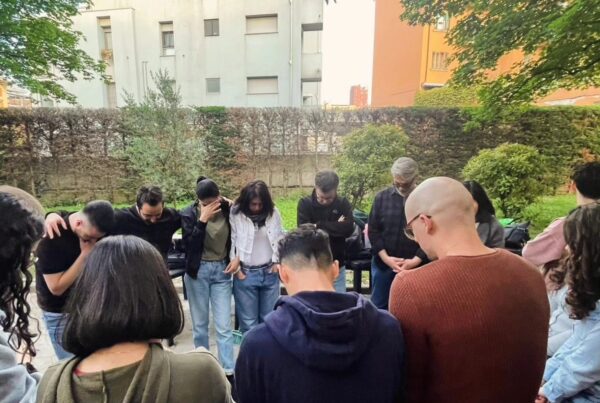You may have noticed that May was Mental Health Awareness Month. I’m glad we can direct our collective attention to important issues like this, but when the calendar rolls over to a new month, the attention is often directed elsewhere. For those struggling with their mental health, help and attention are needed regardless of what the calendar says.
Thankfully, God’s Word doesn’t fall silent based on the time of the year. His Word is living and active (Heb. 4:12); it’s sufficient to lead us in wisdom and godliness (2 Pet. 1:3), and through it, we encounter a loving Father who has fresh mercies new each morning (Lam. 3:22). In light of these truths, we always have a reason to be hopeful. Unfortunately, we don’t always feel hopeful. What do we do when feelings don’t match reality?
It’s More Than a Feeling
It’s common for our feelings to lag behind what we know to be true. Part of the problem with hopelessness is that we can conceive of it exclusively as an emotion. We might also be prone to think if our circumstances changed, we would feel more hopeful. But this isn’t exactly how the Bible presents hope.
Peter tells us to set our hope on the coming of Jesus (1 Pet. 1:13). Paul refers to Jesus as our blessed hope (Titus 2:13). Understanding hope in relation to the person and work of Jesus guards us against missing out on this glorious reality—we can experience hope when our situation seems hopeless. Seemingly hopeless situations are the very soil from which hope grows.
Where Hope Comes From
“For whatever was written in former days was written for our instruction, that through endurance and the encouragement of the Scriptures, we might have hope” (Rom. 15:4). As we think about how to grasp hope when we feel hopeless, Paul highlights two necessary components. It’s common for our feelings to lag behind what we know to be true. Part of the problem with hopelessness is that we can conceive of it exclusively as an emotion. Click To Tweet
First, hope comes through endurance. It’s easy to associate hope with the absence of hardship, but here Paul shows us that hope develops as a result of persevering through hardship (Rom. 5:3–5). We grow hopeful as we endure suffering. If we “cash in our chips” mentally or spiritually when adversity comes our way, hopelessness will naturally take effect.
Additionally, Paul says hope develops “through the encouragement of the Scriptures.” Hardships like illness, the loss of a job, relational conflict, and many others can’t steal our hope. Why? Because our hope isn’t circumstantial. I have listened to hopeless people describe their circumstances as if the things they were experiencing were the reason for their hopelessness.
But God’s Word doesn’t allow us to think this way. Circumstances will always provide an opportunity for us to respond in one of two ways—belief or disbelief in God. When you find yourself hopeless, refocus your heart and mind on the hope-filled Word of God.
Blessing Through Believing
Some people may scoff at the idea of belief being the antidote for hopelessness, but I have a hard time ignoring what God unfolds for us in the Scriptures. What we believe is crucial, whether we’re talking about mental or spiritual health. “May the God of hope fill you with all joy and peace in believing, so that by the power of the Holy Spirit you may abound in hope” (Rom. 15:13, emphasis added).
Where do joy and peace come from? Paul tells us—we’re filled with joy and peace in believing. This joy and peace, which comes through our belief, is our catalyst to abound in hope by the power of the Holy Spirit. If you’re a hopeless person (or walking alongside someone who is), you will not find lasting joy, peace, or hope apart from an active belief in the gospel.
To be clear, I didn’t say “strong” belief. There are certainly times when our faith and belief feel weak. But we shouldn’t abandon belief in God because something feels “off” or we can’t see what God is doing. John Piper said, “God is always doing a thousand things. And sometimes we see two of them.” This joy and peace, which comes through our belief, is our catalyst to abound in hope by the power of the Holy Spirit. Click To Tweet
Show me a genuinely hopeful person, and I will show you someone whose heart is anchored to the gospel in belief. This concept is so important that John uses the word “believe” no less than 80 times in his Gospel. In his first epistle, the apostle continues to highlight the importance of belief. “For everyone who has been born of God has overcome the world. And this is the victory that has overcome the world—our faith. Who is it that overcomes the world except the one who believes that Jesus is the Son of God” (1 John 5:4–5, emphasis added).
In an age where depression, anxiety, and other mental health struggles aim to steal our hope, we must be people who return to the foundation of our faith—belief in the Son of God, who loved us and gave himself for us (Eph. 5:2). Hopeless hearts need to soak up this great truth. May you abound in hope by the power of the Spirit as you believe in the One who calls you “mine.”










